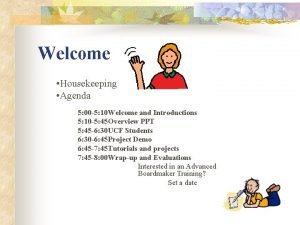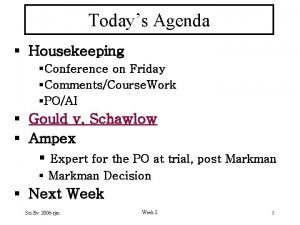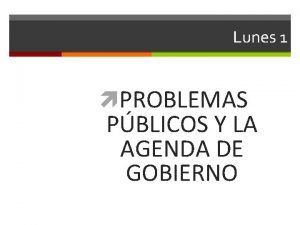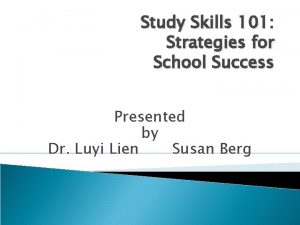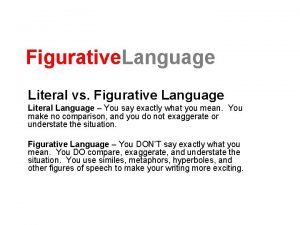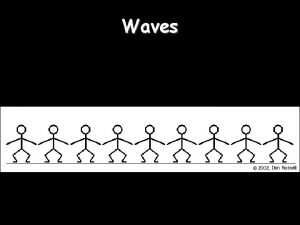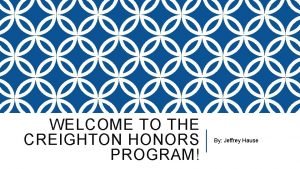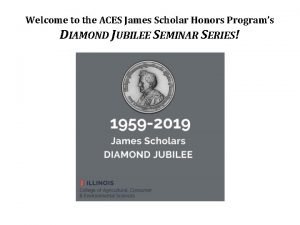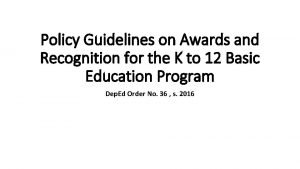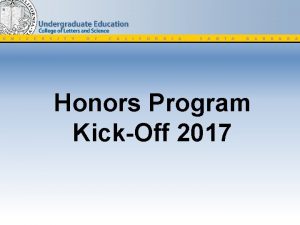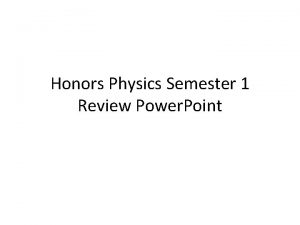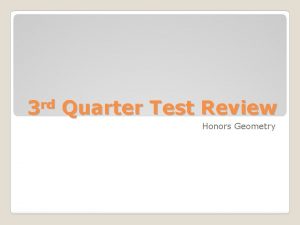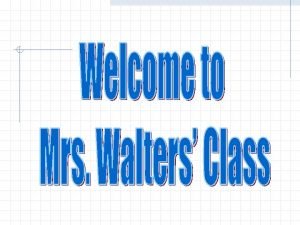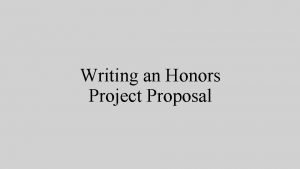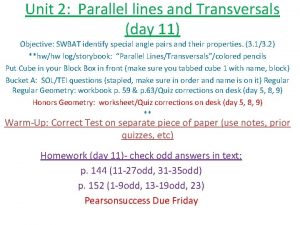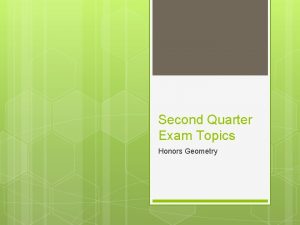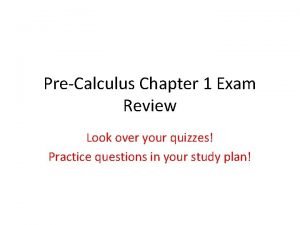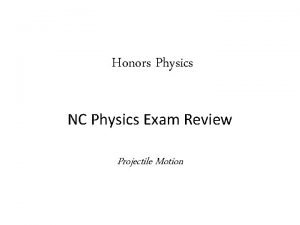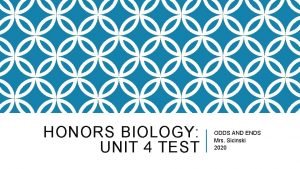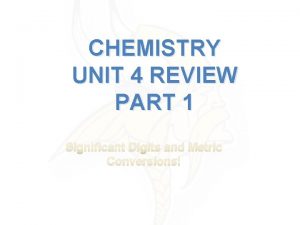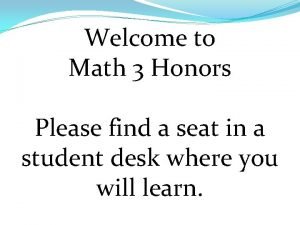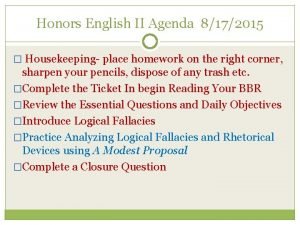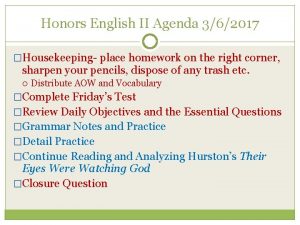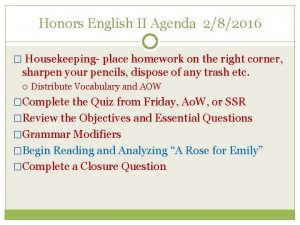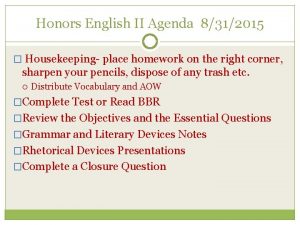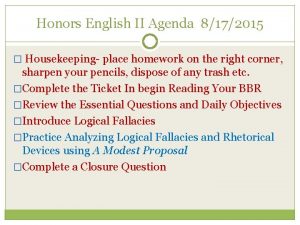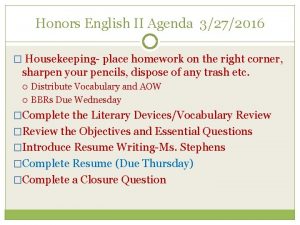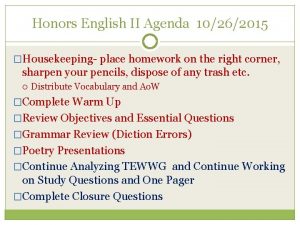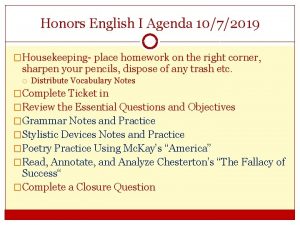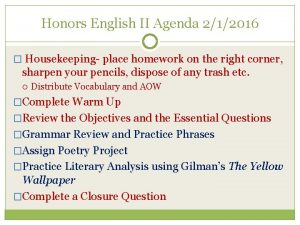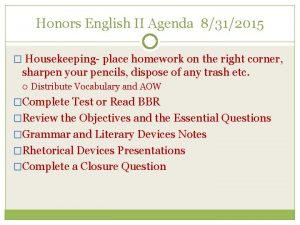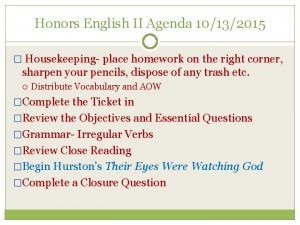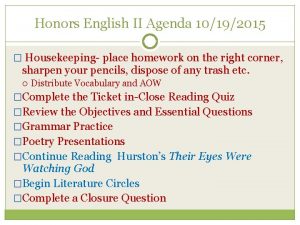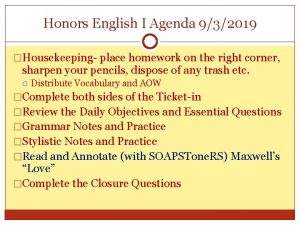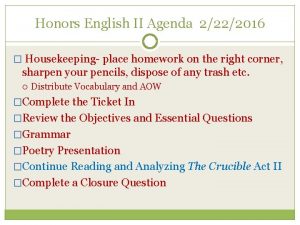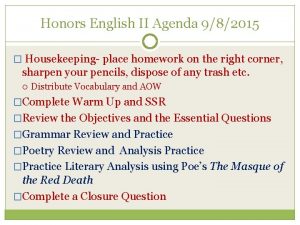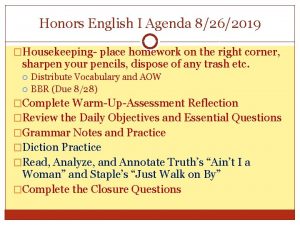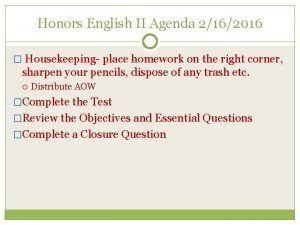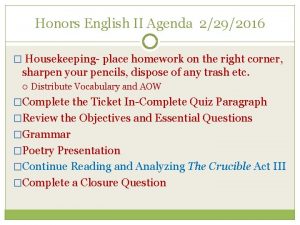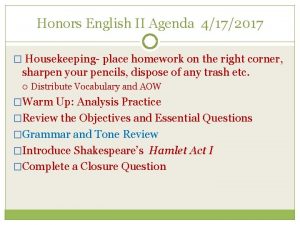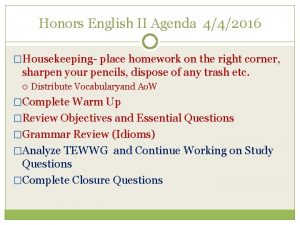Honors English II Agenda 4232018 Housekeeping place homework





































- Slides: 37

Honors English II Agenda 4/23/2018 �Housekeeping- place homework on the right corner, sharpen your pencils, dispose of any trash etc. Distribute AOW, 4 x 4, and Vocabulary �Complete the Warm-Up �Review the Objectives and Essential Questions �Devices and Grammar Review �Read and Analyze Texts Related to Social Class in America �Read, Annotate, and Analyze Chesterton’s “The Fallacy of Success” �Complete a Closure Question

Objectives �Read closely to determine what the text says explicitly and to make logical inferences from it; cite specific textual evidence when writing or speaking to support conclusions drawn from the text. �Determine central ideas or themes of a text and analyze their development; summarize the key supporting details and ideas. �Interpret words and phrases as they are used in a text, including determining technical, connotative, and figurative meanings, and analyze how specific word choices shape meaning or tone. �Analyze the structure of texts, including how specific sentences, paragraphs, and larger portions of the text relate to each other and the whole.

Essential Questions: �What rhetorical techniques does an author use to effectively manipulate his audience? What are the purposes behind each technique? �How does the structure of the text and the point of view influence the reader? �How does an author combine literary and rhetorical elements to create a particular tone, theme, and purpose? �What is the American Dream? Is it accessible to everyone in society? �How do both the American socio-economic system and American cultural stereotypes intersect to impact wealth? �What are the long term effects of poverty? Of privilege? Can they be overcome?

Idioms �What Is an Idiom? �Idioms are common phrases with quirky, nonliteral meanings. Most idioms, like carry through, across the board, come on strong, get your feet wet, bang for the buck, all ears, pull your leg, eat crow, etc. , are so ingrained in our language that we hardly notice that their meanings are so nonliteral. We appreciate our idioms when we hear someone speak who has just learned English, since the idioms take the longest to learn.

Idiom Errors � Idiom errors usually manifest as incorrect/ awkward use of a preposition. Remember that prepositions are words like to, from, of, for, by, in, before, with, beyond, and up that show relative position or direction. Certain idiomatic phrases, like arguing with, require a particular preposition. (That is, saying something like She was arguing against her brother is not a proper idiom. ) The choice of preposition is not usually a matter of logic, as in the sentence The house was on fire, so the firefighters put it out. � This sentence contains two prepositions, on and out, but neither is used literally or logically: the house wasn’t really “on” a fire, and the firemen didn’t put the fire “out. ” But if you tried to make the sentence literal and logical, it would sound ridiculous or overly stilted: The house was aflame, so the firefighters extinguished the blaze.

Idiom Errors �Consequently, idioms are an important part of clear and effective language. �When you notice a preposition in a sentence, always ask: “Is that preposition necessary, and if so, is it the correct preposition for that particular phrase? ” While casual speech often uses extra prepositions, when you write, however, try to eliminate unnecessary prepositions. �Examples: �The pole did not extend out far enough. �Since my injury, it hurts to climb up the stairs. �Although clearly angry, the students were not yet ready to fight against the ruling.

Common Idioms � Regard as � Defined as � Acclaimed as � Angry with/about (not at) � Call for (not to) � Adapted for � Escape from (not to) � Different from � Date from � Independent of (not from) � Free from � Originate in � Concur (opinion) in � Identical to (not with) � Prefer to � Potential for (not to) � Correspond to (not with) � Receptive to (not of) � Correspond with � Identical with � Disagree with � Argue with � Necessary to/for � Pursuit of

Choose the correct preposition or phrase (if any) to complete each of the following sentences. If no word or phrase is required, circle the dash (—). 1. I prefer spaghetti (to/over/more than/—) linguine. 2. The students were protesting (against/over/—) the decision to cut financial aid. 3. We are all concerned (about/with/—) your decision to drop out of school. 4. It took nearly an hour to open (up/—) the trunk. 5. Eleanor has always been concerned (with/about/—) feminist issues. 6. We all agreed (on/with/about/—) the decision to go skiing rather than hiking. 7. She would not agree (to/on/with/about) the plea bargain.

Idiom Answers 1. 2. 3. 4. 5. 6. 7. To None About (concerned about means worried about) None With (concerned with means occupied with or involved in) On (You agree on mutual decisions or plans) To (You agree to offers)

Detail Practice “We went upstairs, through period bedrooms swathed in rose and lavender silk and vivid with new flowers, through dressingrooms and poolrooms, and bathrooms, with sunken bathsintruding into one chamber where a disheveled man in pajamas was doing liver exercises on the floor. ” –Fitzgerald, The Great Gatsby 1. List three general adjectives that you could use to describe this house. Explain the connection between the detail in Fitzgerald’s sentence and the adjectives you have chosen. 2. How does the “disheveled man in pajamas…doing liver exercises on the floor” help created the mood and atmosphere of the house? 3. Rewrite the sentence eliminating the specific detail. Read your sentence to your partner and discuss the change in impact and meaning.

In Group Read the Articles and View the Clips Below https: //nypost. com/2015/12/27/the-rise-and-fallof-middle-class-america/ 2. https: //www. npr. org/2016/07/07/484941939/aportrait-of-americas-middle-class-by-the-numbers 3. https: //www. pbs. org/wgbh/frontline/film/twoamerican-families/ (Segment 1) 4. http: //abcnews. go. com/GMA/video/americasshrinking-middle-class-44755164 1.

After Completing the texts: Discuss the following with your group: �What is the American Dream? Is it possible for everyone in America to participate? �Does capitalism limit or allow all people access to the American Dream? �How is wealth distributed in America? �How do people gain access to wealth? �What factors contribute to socio-economic mobility? �How do each of these factors contribute to the cycle of poverty in America? Education Family Structure Health Location

Education �National workplace emphasis on advanced degrees �Necessity of a high school diploma �Family support, including time and supplemental funds �Preparation for learning �Access to quality schools �Mobile existence �“Tracking” of students in schools �Working outside of school �Civic engagement

Health �Nutrition and food security �Access to quality medical care �Cognitive health, including problem-solving and decision-making �Chronic illnesses, such as diabetes or asthma �Mental illnesses, such as depression or bipolar disorder �Physical disabilities �Safe neighborhoods �Safe schools

Location �Access to a safe neighborhood �Urban and rural access to quality food �Urban and rural access to quality schools �Rural access to quality jobs �Rural access to quality medical care �Rural access to social networks �Link between property taxes and school budgets

Family Structure �Access to a safe home �Marital status of parents or guardians �Gender of single parent or guardian �Education level of parent or guardian �Income level of parent or guardian �Incarceration of a parent or guardian �Number of working persons in the home �Number of children in the home �People who live alone

Honors English II Agenda 4/24/2018 �Housekeeping- place homework on the right corner, sharpen your pencils, dispose of any trash etc. Vocabulary Notes �Complete the Warm-Up �Review the Objectives and Essential Questions �Stylistic Devices and Grammar Review �Begin Reading Fitzgerald’s The Great Gatsby �Complete a Closure Question

Objectives: � Read closely to determine what the text says explicitly and to make logical inferences from it; cite specific textual evidence when writing or speaking to support conclusions drawn from the text. � Determine central ideas or themes of a text and analyze their development; summarize the key supporting details and ideas. � Interpret words and phrases as they are used in a text, including determining technical, connotative, and figurative meanings, and analyze how specific word choices shape meaning or tone. � Analyze the structure of texts, including how specific sentences, paragraphs, and larger portions of the text relate to each other and the whole.

Essential Questions: � What rhetorical techniques does an author use to effectively manipulate his audience? What are the purposes behind each technique? � How does the structure of the text and the point of view influence the reader? � How does an author combine literary and rhetorical elements to create a particular tone, theme, and purpose? � What is the American Dream? Is it accessible to everyone in society? � How do both the American socio-economic system and American cultural stereotypes intersect to impact wealth? � What are the long term effects of poverty? Of privilege? Can they be overcome?

Idiom Practice 1. We found dozens of old photographs hidden (in/—) between the pages. 2. Good study habits are necessary (to/for/in) academic success. 3. The new house color is not very different (from/than/to/—) the old one. 4. His girlfriend was angry (with/at/—) him for not calling sooner. 5. It will be many years before we fill (up/—) all the pages in this photo album. 6. They were both angry (about/at/with) the boys’ behavior. 7. You should plan (to come/on coming) before 6: 00 pm.

Idiom Practice Answers 1. 2. 3. 4. 5. 6. 7. None To or for From (use than only with comparatives like bigger; different is not a comparative) With (you get angry with people) None About (you get angry about situations) To come (plan to means make a plan to , plan on means rely on)

Syntax Practice “I hear an army charging upon the land, /And the thunder of horses plunging, foam about their knees: / Arrogant, in black armor, behind them stand, / Disdaining the reins, with fluttering whips, the charioteers. –Joyce, “I Hear an Army” 1. The subject of the verb stand in line 3 is charioteers at the end of line 4. How does this inversion of the normal word order (subject then verb) affect the impact of those lines? 2. Examine the adjectives and adjective phrases in lines 3 and 4: arrogant, in black armor. What word do these adjectives modify? How does this unusual word order affect the impact of the lines?

Honors English II Agenda 4/25/2018 �Housekeeping- place homework on the right corner, sharpen your pencils, dispose of any trash etc. BBR Due �Complete the Warm-Up �Review the Objectives and Essential Questions �Stylistic Devices and Grammar Review �Continue to Read and Analyze Fitzgerald’s The Great Gatsby �Complete a Closure Question

Objectives: � Read closely to determine what the text says explicitly and to make logical inferences from it; cite specific textual evidence when writing or speaking to support conclusions drawn from the text. � Determine central ideas or themes of a text and analyze their development; summarize the key supporting details and ideas. � Interpret words and phrases as they are used in a text, including determining technical, connotative, and figurative meanings, and analyze how specific word choices shape meaning or tone. � Analyze the structure of texts, including how specific sentences, paragraphs, and larger portions of the text relate to each other and the whole.

Essential Questions � What rhetorical techniques does an author use to effectively manipulate his audience? What are the purposes behind each technique? � How does the structure of the text and the point of view influence the reader? � How does an author combine literary and rhetorical elements to create a particular tone, theme, and purpose? � What is the American Dream? Is it accessible to everyone in society? � How do both the American socio-economic system and American cultural stereotypes intersect to impact wealth? � What are the long term effects of poverty? Of privilege? Can they be overcome?

Consider the idiom in each sentence and fill in the correct preposition, if one is required. 1. The interview provided insight _____ what great directors think about. 2. We were very angry _____ him for ignoring our phone calls. 3. Her tests include questions that seem very different _____ those that we see in the homework. 4. My mother preferred my singing _____ my practicing guitar. 5. Detective Simone ran in pursuit _____ the perpetrators. 6. We had to shoo the cat off _____ the car. 7. When she arrived on campus, she felt truly independent _____ her parents for the first time.

Idiom Practice Answers 1. 2. 3. 4. 5. 6. 7. Into With From To Of None Of

Syntax Practice When the moment is ripe, only the fanatic can hatch a genuine mass movement. Without him the disaffection engendered by militant men of words remains undirected and can vent itself only in pointless and easily suppressed disorders. Without him the initiated reforms, even when drastic, leave the old way of life unchanged, and any change in government usually amounts to no more than a transfer of power from one set of men of action to another. -Hoffer, “The Fanatics” 1. This passage uses the phrase “without him” three times. What effect does this have on the overall impact of the passage? 2. How does the length of the last sentence affect the meaning of the passage.

Honors English II Agenda 4/26/2018 �Housekeeping- place homework on the right corner, sharpen your pencils, dispose of any trash etc. �Complete the Warm-Up �Review the Objectives and Essential Questions �Stylistic Devices and Grammar Review �Continue to Read and Analyze Fitzgerald’s The Great Gatsby �Complete a Closure Question

Objectives � Read closely to determine what the text says explicitly and to make logical inferences from it; cite specific textual evidence when writing or speaking to support conclusions drawn from the text. � Determine central ideas or themes of a text and analyze their development; summarize the key supporting details and ideas. � Interpret words and phrases as they are used in a text, including determining technical, connotative, and figurative meanings, and analyze how specific word choices shape meaning or tone. � Analyze the structure of texts, including how specific sentences, paragraphs, and larger portions of the text relate to each other and the whole.

Essential Questions � What rhetorical techniques does an author use to effectively manipulate his audience? What are the purposes behind each technique? � How does the structure of the text and the point of view influence the reader? � How does an author combine literary and rhetorical elements to create a particular tone, theme, and purpose? � What is the American Dream? Is it accessible to everyone in society? � How do both the American socio-economic system and American cultural stereotypes intersect to impact wealth? � What are the long term effects of poverty? Of privilege? Can they be overcome?

Identify the grammar or usage error in the following sentences-if there is no error select E 1. 2. 3. 4. By virtue of (A) its size and supersensitive electronics, modern radio telescopes are able to gather more waves and (B) discriminate among (C) them with greater precision (D) than earlier versions could. No error Air pollution caused by industrial fumes (A) has been studied for years, (B) but only recently (C) has the harmful effects of noise pollution (D) become known. No error (A) No matter how (B) cautious snowmobiles (C) are driven, they are capable (D) of damaging the land over which they travel. No error The starling is (A) such a pest in rural areas that it (B) has become necessary (C) to find ways of controlling the growth (D) of their population. No error

Answers A 2. C 3. B 4. D 1.

Syntax Practice “While we do these things, these deeply momentous things, let us be very clear, and make very clear to all the world, what our motives and our objects are. ” –Wilson, “President Woodrow Wilson Presents and Ideal to the War Congress” 1. This is a periodic sentence, one in which the subject and verb are delayed until the final part of the sentence. This creates syntactic tension and emphasizes the ideas at the end of the sentence. What ideas are stressed in this periodic sentence? 2. How would it change the effectiveness of the sentence if we rewrote it as: “Our motives and objects must be clear to all the world while we do these deeply momentous things. ”

Honors English II Agenda 4/27/2018 �Housekeeping- place homework on the right corner, sharpen your pencils, dispose of any trash etc. AOW, 4 x 4 Sheet Chesterton’s “Fallacy of Success” and The Great Gatsby �No Warm Up �Review the Daily Objectives and Essential Questions �Test and Essay

Essential Questions: � What rhetorical techniques does an author use to effectively manipulate his audience? What are the purposes behind each technique? � How does the structure of the text and the point of view influence the reader? � How does an author combine literary and rhetorical elements to create a particular tone, theme, and purpose? � What is the American Dream? Is it accessible to everyone in society? � How do both the American socio-economic system and American cultural stereotypes intersect to impact wealth? � What are the long term effects of poverty? Of privilege? Can they be overcome?

Syntax Practice “She is a woman who misses moisture, who has always loved low green hedges and ferns. ” –Ondaatje, The English Patient 1. Both of the subordinate clauses in this sentence modify “woman. ” What effect does this parallel structure have on the sentence? 2. How would it change the feeling evoked by the sentence if it read: “She misses moisture and has always loved low green hedges and ferns. ”
 Background color
Background color Housekeeping agenda
Housekeeping agenda English 2 honors vocabulary unit 1
English 2 honors vocabulary unit 1 Agenda sistemica y agenda institucional
Agenda sistemica y agenda institucional Homework oh homework
Homework oh homework Homework oh homework i hate you you stink
Homework oh homework i hate you you stink Parts of a poem
Parts of a poem Homework oh homework i hate you you stink
Homework oh homework i hate you you stink Alitteration definition
Alitteration definition Consonance
Consonance Place place value and period
Place place value and period Disturbance that transfers energy
Disturbance that transfers energy A wave is a disturbance that transfers energy
A wave is a disturbance that transfers energy Creighton honors program
Creighton honors program James scholar uiuc aces
James scholar uiuc aces Do no. 36 s. 2016
Do no. 36 s. 2016 Ucsb urca
Ucsb urca Physics semester 1 review
Physics semester 1 review Honors biology ecology test
Honors biology ecology test Uncle sam's toolbox assignment answers
Uncle sam's toolbox assignment answers Honors geometry quadrilaterals test
Honors geometry quadrilaterals test Honors earth science
Honors earth science Kuei honors chemistry
Kuei honors chemistry Mrs blueprint
Mrs blueprint Hilton honors military program
Hilton honors military program Honors project
Honors project Honors biology properties of water lab
Honors biology properties of water lab Honors geometry parallel lines and transversals worksheet
Honors geometry parallel lines and transversals worksheet Tulane honors program
Tulane honors program Second quarter exam
Second quarter exam Pre calculus chapter 1
Pre calculus chapter 1 Vyi physics
Vyi physics Honors biology unit 4 test
Honors biology unit 4 test Smc scholars classes
Smc scholars classes Chemistry unit 4 review answers
Chemistry unit 4 review answers Math 3 honors
Math 3 honors Crystalline solid and amorphous solid
Crystalline solid and amorphous solid Honors chemistry summer assignment
Honors chemistry summer assignment
